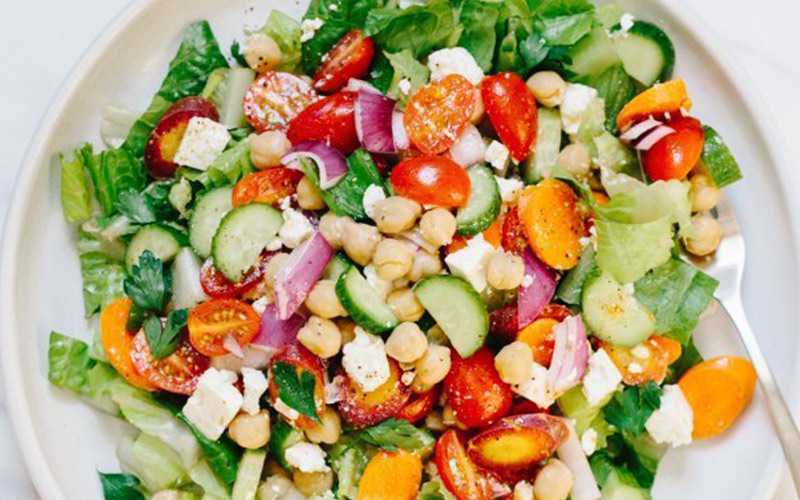Right now, most of the research has been done on a Mediterranean diet, with some research showing that people who eat this way (think: cutting out processed junk and loading up on fiber-rich veggies, fruits, fish, nuts, beans, legumes, olive oil, fermented foods, and some meat) have a 30-50 percent lower risk of depression. But many experts agree that there may not be one diet that’s optimal for mental health. A number of dietary approaches, provided they include the right balance of brain-boosting nutrients (e.g. omega-3s, vitamin B12, zinc, iron, magnesium, and vitamin D) may do the trick.
To help his patients cover their nutritional bases, Ramsey guides them toward the nutrient-dense food groups that most Americans fall short in: leafy greens, brightly colored “rainbow” vegetables, seafood, and fermented foods. From there, he’ll talk with patients about what food within those categories they might enjoy and how to prep and cook them in a simple, joyful way. As a useful tool, he and a colleague created an antidepressant food list, featuring the plant and animal foods (oysters, salmon, watercress, and spinach to name a few) that contain the highest levels of nutrients proven to help prevent or reduce depression.
Interestingly, while plant-based diets are often considered the holy grail, they may not actually be ideal for mental health. “There’s some correlational data that people who eat no red meat, or who eat vegetarian diets, are at a much greater risk of depression,” says Ramsey. “This isn’t popular data among the plant-based crowd, but I think it’s important to consider.” But even so, Ramsey believes it’s his job as a nutritional psychiatrist to help you “feed your brain” regardless of the particular diet you subscribe to—whether that’s Whole30 or vegan. So, if you’re passionate about consuming zero animal products, he’ll provide support and make sure you’re eating and supplementing in a way that supports mental wellness.
Other nutritional psychiatrists, like Ede, take a slightly different approach. While she says the most important food rule for mental health is to eat whole foods and avoid modern processed foods (namely refined carbohydrates and refined vegetable oils like soybean and corn oil), she often suggests that patients experiment with eliminating grains, legumes, and dairy as well.
“I generally recommend what I call a ‘pre-agricultural whole foods diet’ made up of whole plant and animal foods as one of the best ways to meet the brain’s nutritional needs,” she says. While nixing all grains and legumes may sound odd, she says these foods contain phytic acid, which can interfere with the absorption of important brain-healthy minerals like magnesium and zinc; and lectins, which can damage the gut lining and aggravate the immune system. This approach is enough for most people, but sometimes Ede will go a step further with patients. “For people who have insulin resistance, I recommend a lower-carbohydrate or perhaps even very low-carbohydrate ketogenic version of this same diet.”
Several years ago, Ede met with a 40-year-old woman who’d had lifelong symptoms of procrastination, poor motivation, low energy, distractibility, and disorganization that interfered with her work and home life. She diagnosed her with ADHD and prescribed Aderall, which definitely helped, but brought uneven benefits throughout the day and caused unpleasant side effects like constipation. She gradually removed grains, legumes, dairy, and most processed foods from her diet, which helped her mood and improved her physical health, yet did nothing for her ADHD. But when she agreed to try a ketogenic diet this year, her symptoms began improving within a few days. “She has since stopped taking Adderall and reports that she functions even better when in ketosis than on Adderall, and without any side effects,” says Ede.
The truth is, every body is a little bit different, and the fact that there are slightly different approaches within the nutritional psychiatry field is likely a really good sign.
“Our food choices, both directly, as well as through influencing the activity of our gut bacteria, play a meaningful role in regulating our moods,” says Perlmutter.
In fact, according to the experts I interviewed, there are likely three main mechanisms by which by which the diets described above promote mental wellness: by providing your brain with the nutrients it needs to grow and generate new connections, tamping down inflammation, and promoting gut health.
“Our brains continue to make new connections that give birth to new brain cells into our adult life, which is known as neuroplasticity, and the major regulator of this process is a neurohormone called brain derived neurotrophic factor (BDNF),” says Ramsey. Low levels of BDNF have been associated with both depression and Alzheimer’s, but certain nutrients such as zinc, magnesium, and the omega-3 fatty acid DHA promote the expression of BDNF.
Nixing refined carbohydrates, sugars, and highly processed vegetable oils can help significantly reduce inflammation as well. “Inflammation causes oxidative stress (a form of biochemical stress), which leads to distress signals in the brain that can lead to either depression or anxiety—or both,” integrative physician Vincent Pedre, M.D., recently told mbg. “On the flip side, we know that the brain will release [pro-inflammatory] cytokines in response to mental stress.”
This is why an anti-inflammatory diet, like the Mediterranean diet, which contains fatty fish rich in omega-3s can be such a great choice. “DHA is powerfully anti-inflammatory and has been associated not only with reduced Alzheimer’s risk, but improvement of depression as well,” says Perlmutter.
Finally, by forgoing processed foods and eating more fiber-rich foods (veggies, fruits, legumes, whole grains), prebiotic foods (onions, scallions, garlic, artichokes, leeks, cabbage) and probiotic foods (fermented foods like kimchi, sauerkraut, and kefir), the good bacteria in our gut are able to thrive, leading to an overall healthy microbiome. “Quite a bit of research shows that the microbiome really impacts our reaction to stress and anxiety,” says Lisa Mosconi, PhD, a neuroscientist, nutritionist, and associate director of the Alzheimer’s Prevention Clinic at Weill Cornell Medical College.
This is in part due to the gut’s impact on GABA, the major inhibitory neurotransmitter that’s been implicated in a multitude of health challenges including anxiety disorders, insomnia, and depression. When our microbiome is healthy and populated with good bacteria, we can better regulate GABA production and benefit from its calming, soothing properties, says Mosconi. Too much bad bacteria, on the other hand, can sort of hijack the GABA system and impair your ability to cope with stress.
Beyond these three mechanisms, diets rich in whole foods are generally just great for maintaining balanced blood sugar, which is key for staying calm, happy, and level headed on a day-to-day basis.
This content was originally published here.




